|
|
|
Sort Order |
|
|
|
Items / Page
|
|
|
|
|
|
|
| Srl | Item |
| 1 |
ID:
074374
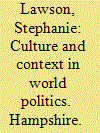

|
|
|
|
|
| Publication |
Hampshire, Palgrave Macmillan, 2006.
|
| Description |
xi, 263p.
|
| Standard Number |
023000766X
|
|
|
|
|
|
|
|
|
|
|
|
Copies: C:1/I:0,R:0,Q:0
Circulation
| Accession# | Call# | Current Location | Status | Policy | Location |
| 051782 | 306.2/LAW 051782 | Main | On Shelf | General | |
|
|
|
|
| 2 |
ID:
114924


|
|
|
|
|
| Publication |
2012.
|
| Summary/Abstract |
The failure of democracy in Fiji is usually attributed to an ethnically fractured polity in which indigenous Fijians have asserted superior rights over those of immigrant communities, especially those of Indian descent. In 1987, an indigenous-dominated military ousted a government elected largely on the strength of Indo-Fijian votes, as did a civilian-led coup in 2000. Another in 2006, however, has confounded explanations of Fiji's politics based on a simple dichotomy of interests between indigenous Fijians and Indo-Fijians when the military toppled a government controlled by indigenous nationalists. A constitutional review process, supervised by the military and purportedly leading to a new, liberal constitution enshrining political equality for all ethnic groups in Fiji, is now in train. This article focuses on the historic production of indigenous nationalism and the demand for "ethnic democracy" and an assessment of the prospects for future constitutional government along inclusive liberal lines.
|
|
|
|
|
|
|
|
|
|
|
|
|
|
|
|
| 3 |
ID:
046389
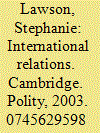

|
|
|
|
|
| Publication |
Cambridge, Polity, 2003.
|
| Description |
viii, 160p.
|
| Standard Number |
0745629598
|
|
|
|
|
|
|
|
|
|
|
|
Copies: C:1/I:0,R:0,Q:0
Circulation
| Accession# | Call# | Current Location | Status | Policy | Location |
| 046495 | 327/LAW 046495 | Main | On Shelf | General | |
|
|
|
|
| 4 |
ID:
049512
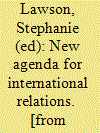

|
|
|
|
|
| Publication |
Cambridge, Polity Press, 2002.
|
| Description |
xiii, 234p.
|
| Standard Number |
0745628613
|
|
|
|
|
|
|
|
|
|
|
|
Copies: C:1/I:0,R:0,Q:0
Circulation
| Accession# | Call# | Current Location | Status | Policy | Location |
| 045238 | 327/LAW 045238 | Main | On Shelf | General | |
|
|
|
|
| 5 |
ID:
129833
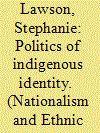

|
|
|
| 6 |
ID:
061918


|
|
|
| 7 |
ID:
144906


|
|
|
|
|
| Summary/Abstract |
Regional organization in Oceania has a history dating to the early post-war period while the rise of regional identities occurred somewhat later in the context of independence. This paper analyzes regionalization processes and accompanying discourses of regionalism relating to both pan-Pacific and more recent sub-regional developments. It pays particular attention to the dynamics of identity politics in the post-independence period and how these have played out in tensions within and between the varying exercises in regionalization.
|
|
|
|
|
|
|
|
|
|
|
|
|
|
|
|
| 8 |
ID:
107606


|
|
|
|
|
| Publication |
2011.
|
| Summary/Abstract |
The paradigmatic case in which an almost permanent impasse exists in coming to terms with a difficult war past and 'normalizing' its international relations is that of Japan. Although successive Japanese governments have apologized over the last few decades, these have been countered by periodic episodes within Japan revolving largely around history textbooks, the remembrance of war dead and the quest by nationalists to restore national pride in the past. Regional relations were especially strained during the premiership of Koizumi Juni'chirô and his immediate successor, Abe Shinzô. They improved under Fukuda Yasuo, a moderate on war memory issues, and remained steady under Asô Tarô. Japan's latest prime minister, Hatoyama Yukio, appears determined to address Japan's war past more openly and critically than previous LDP figures, no doubt with an eye to improving Japan's relations with its Asian neighbours. But whatever line he pursues, contestation over war memories will remain an issue. They are driven by deep divisions within Japan at the same time that political leaders seek a more prominent identity for Japan as a 'normal' actor in international affairs. This article analyses key aspects of the politics of Japan's war memories, using insights from collective memory studies and constructivist IR theory. We suggest that the quest for 'normality' has generated a set of tensions and contradictions over the issue of war memories, both domestically and internationally, for which there is no resolution in sight.
|
|
|
|
|
|
|
|
|
|
|
|
|
|
|
|
| 9 |
ID:
190655
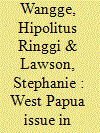

|
|
|
|
|
| Summary/Abstract |
Pacific island countries have paid increasing attention to the situation in Indonesia’s easternmost provinces of Papua and West Papua (commonly referred to collectively as West Papua) in recent years, prompted mainly by continuing human rights abuses as well as the more general political and economic marginalization of indigenous West Papuan people since integration with Indonesia in 1969. This article addresses some key questions concerning Indonesia’s failure to deal effectively with the issue. Against a background of reactionary hypernationalism on the one hand, and a rhetorical anti-colonial internationalism on the other, domestic policy with respect to the treatment of indigenous West Papuans has, for the most part, seen a continuation of repressive authoritarian measures. And in responding to international criticisms, foreign policy has been poorly handled. There has been a lack of serious engagement with human rights issues as reflected in ongoing denial of abuses in the provinces and a generally reactive and defensive foreign policy approach. At a bureaucratic level, there is little coordination between the Ministry of Foreign Affairs and other ministries with responsibilities for West Papua, and therefore no effective basis on which to build a coherent policy response. Another problem consists in Indonesia’s often clumsy public diplomacy in the Pacific islands region. As a consequence, the West Papua issue continues to grow in prominence in Pacific regional politics and beyond.
|
|
|
|
|
|
|
|
|
|
|
|
|
|
|
|
| 10 |
ID:
146527
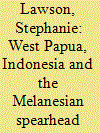

|
|
|
|
|
| Summary/Abstract |
The idea of a shared Melanesian identity has been consolidated over the last three decades or so through the most important subregional organisation in the South-West Pacific—the Melanesian Spearhead Group (MSG). The solidarity of this group has been strained over various issues from time to time, but none is as fraught as the Indonesian occupation of what is commonly known as West Papua, whose indigenous Papuan people are ethnically Melanesian. In addition to recounting the Indonesian takeover of West Papua in the context of the dynamics of decolonisation, the Cold War and early regional development, the article examines the emergence of Melanesian identity and the MSG, before considering more recent developments. These focus on a recent bid by West Papuans for MSG membership, key aspects of Indonesia's role in the Melanesian subregion, and the extent to which these developments highlight competing logics in regional and international politics.
|
|
|
|
|
|
|
|
|
|
|
|
|
|
|
|
|
|
|
|
|